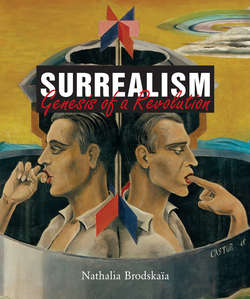Читать книгу Surrealism - Nathalia Brodskaya - Страница 8
На сайте Литреса книга снята с продажи.
Surrealism
The Baptism of Surrealism
ОглавлениеSurrealism found its name almost as spontaneously as had Dada, the only difference being that unlike “Dada”, the term “Surrealism” possessed an exact meaning. The word “Surrealism” means “above realism”, “higher than realism”. Not only as a term, but also as a concept, Surrealism arose far earlier than the artistic tendency that sprang up over Dadaist foundations. The inventor of the term was Guillaume Apollinaire, idol of the avant-garde, author of “Alcools”, and, according to Louis Aragon, “the only man still capable of sprinkling with precious alcohol a France which had been dried up by the war.”[39] The premier of his play, “The Breasts of Tiresias”, was held in the Théâtre René-Maubel in Montmartre on June 24, 1917, but according to Apollinaire it was written much earlier, in 1903. The subtitle read: “A surrealist drama in two acts with a prologue”. In the preface to the play Apollinaire stated that he had written it for the French in the way that Aristophanes had written comedies for the Athenians. Although the theme – the problem of procreation – is very important, he did not want to write a play in a moralising tone, and summoned his fantasy to his aid. “I warned them (the French – N. B.) of the serious danger, recognisable to all, which a nation laying claim to prosperity and power would undergo if it was fast losing the desire to bring children into the world, and I showed them how to deal with the crisis and what ought to be done to that end.”[40] In his article in the newspaper Le Pays the critic Victor Bach wrote: “M. Guillaume Apollinaire’s play is a surrealist drama, that is, in plain French, a symbolist drama.”[41] Apollinaire wrote in the preface to the play: “For the definition of my drama I made use of a neologism, which is something for which I ought to be forgiven, as that sort of thing rarely happens with me, and I thought up the adjective ‘surrealist’ – it does not conceal any symbolic meaning… but fairly exactly defines a tendency in art which, although it is not new, like everything under the sun, has in any case never up to now served to formulate any kind of credo, any kind of artistic or literary hypothesis.”[42] Apollinaire said that he was aiming to be above the blind replication of nature; he did not want to imitate nature in the manner of photographers. In his search for a term, he strove to be as exact as possible. “All things considered”, he wrote in one of his letters, “I really think that it would be better to adopt surrealism rather than ‘supernaturalism’, which is what I used first. Surrealism does not yet exist in the dictionaries, and it will be more convenient to use than the word ‘supernaturalism’ that is already in use.”[43]
Apollinaire’s term showed itself capable of being widely employed. It was applied both to theatre and literature, and also to every branch of the visual arts. It could relate to new art and to the work of artists of the past; it was of sufficiently wide scope to be able to accommodate the ambition of many generations of creative artists to go outside the framework of the visible, real world. Surely poets and painters have striven throughout the ages to rise above reality, to find the freedom for fantasy, to open an outlet to the world of the unknown and the mysterious. Apollinaire introduced an expressive example into the preface to his play: [while] searching for a way to imitate walking, man invented the wheel, he wrote, which is not at all the same as the leg; in other words, man discovered Surrealism without knowing it. Before Apollinaire passed away on November 9, 1918, he had sketched out the contours of the Surrealist movement that was about to come into existence, and had given it a name. But it was not until 1924 that André Breton linked the term Surrealism to the new direction being taken by literature and the fine arts. “In homage to Guillaume Apollinaire”, he wrote, “… Soupault and I assigned the name of Surrealism to the new mode of pure expression…”[44] Nevertheless, Breton could not agree completely with Apollinaire. He thought that for the new artistic language, “supernaturalism”, the term that was employed by Gérard de Nerval, was possibly more suitable. Nerval intended this term to cover not only his own art, but creative work of any kind that was made subject not to the copying of reality, but to the imagination, the same approach Apollinaire had in mind. Every artist whose dreams and visions are transformed in the work into a reality creates “in this state of supernaturalist reverie”, he wrote.[45]
39
Quoted in Michel Sanouillet, op. cit., p. 57
40
“Apollinaire”, St. Petersburg, 1999, p. 440
41
Ibid., p. 547
42
Ibid., p. 438
43
Maurice Nadeau, op. cit., p. 16
44
André Breton, Manifeste du surréalisme, Paris, 1991, p. 35
45
Gérard de Nerval, Les Filles du feu, Paris, 1994, p. 82
